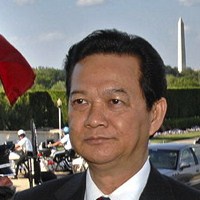Vietnam’s prime minister, Nguyen Tan Dung, recently survived a confidence vote in the National Assembly as well as severe pressure at the most recent party plenum. As prime minister of a country ostensibly ruled by the Vietnamese Communist Party (VCP), he is theoretically subordinate to the Politburo, yet his personal political power has allowed him to continue in office.
Due to the resulting political paralysis, however, policy across the board is in limbo. Foreign governments and businesses used to be able to expect that decisions backed by the Politburo of the VCP were enforceable. This is no longer the case. Whether it has to do with the South China Sea, relations with the U.S. or international institutions such as the World Bank and the International Monetary Fund, nobody really knows what an official piece of paper means in Vietnam and what the authority behind it is, if any. Economic growth has slowed, and a wide range of economic policies remain dead letters, especially measures to control corruption and regain macroeconomic stability.
Vietnam’s political crisis runs very deep and cannot be resolved without fundamental political change. Behind the facade of political institutions, Vietnam has no clear domestic sovereignty. In essence, Vietnam has become a “land without a king.”

